
views
Safety remains a constant concern for seniors and people with health conditions. Medical alert systems like MobileHelp offer an array of options to provide additional protection and peace of mind to its users and their relatives.
In this in-depth review, we’ll explore the best medical alert systems providers and offer insight into what you need to know when choosing one. We’ll cover everything from types and features to costs you can expect, so let’s get started.
Best Medical Alert Systems
- MobileHelp – Best medical alert systems overall
- ADT – Best for home security integration
- Medical Guardian – Best for customization
- Bay Alarm Medical – Best for affordability
- Medical Alert – Best for straightforward features
- LifeStation – Best for emergency assistance
- Lively – Best for caregiver coordination
- Lifeline – Best for user-friendly technology
- Aloe Care Health – Best for smart home integration
Best medical alert systems providers bring their unique strengths and features to the table. Whether it’s mobility, dependability, comprehensive care, or advanced monitoring you are looking for, there’s a solution for your needs. We cover some of the most popular providers and their services below.
1. MobileHelp – Best Medical Alert Systems Overall
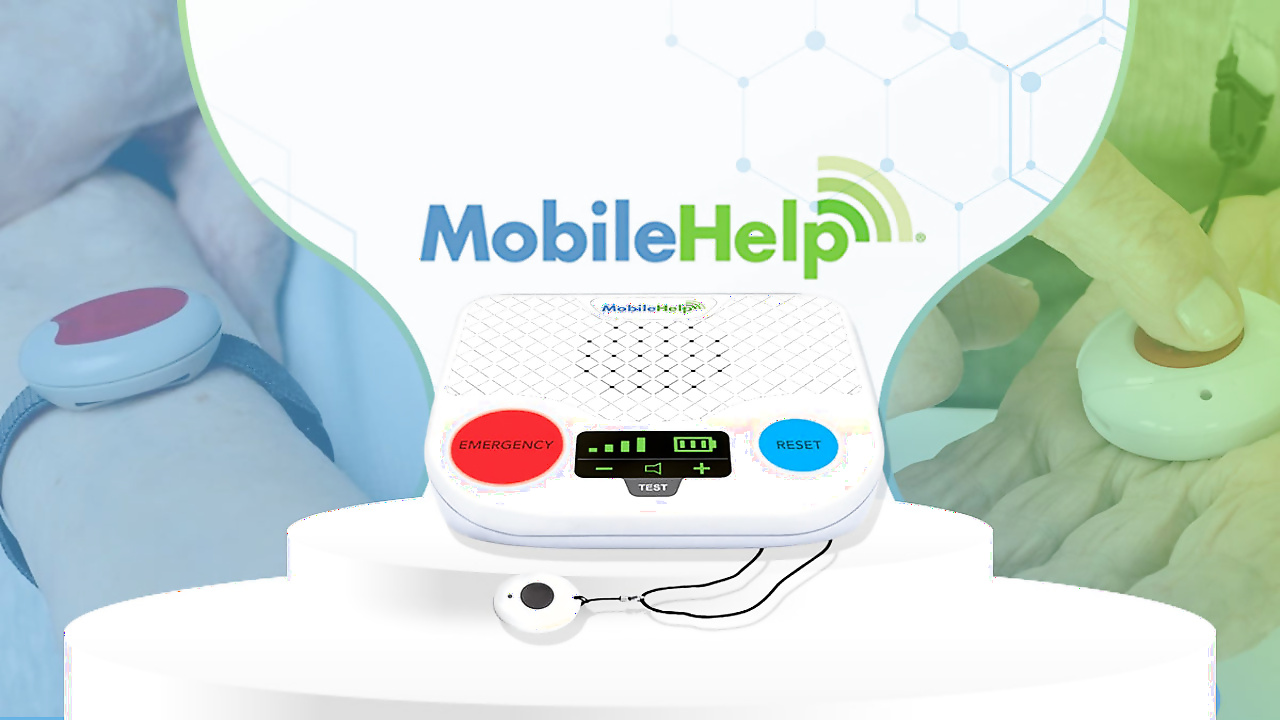
Pros:
- Mobile and landline connectivity
- Location tracking via GPS technology
- Three options for medical alert systems
- User-friendly devices
- Connect Premium program available
Cons:
- No upfront device pricing
Overview
MobileHelp stands out as a reputable provider of medical alert devices. It caters to the safety needs of active individuals who need protection both within their homes and on the go.
With a deliberate focus on mobility and cutting-edge technology, MobileHelp’s suite of devices is equipped with various features designed to provide seniors and their families with a sense of security and peace of mind, regardless of their location.
Why We Chose MobileHelp
Among the many options available in the market, MobileHelp earned its place as our top pick due to its dedication to mobile connectivity and user-centric design.
MobileHelp ensures accurate and precise location tracking during emergencies and a seamless experience for individuals leading active lifestyles. It integrates advanced cellular networks and state-of-the-art GPS technology in the best medical alert systems. This specialization in mobility sets MobileHelp apart as a leader in the industry.
Cost
MobileHelp offers three options for customers who need the best medical alert systems: MobileHelp Classic, Solo, and Duo. The cost is not listed on the website, but you can request a quote.
You can select the plan that aligns with your preferences and financial considerations. Moreover, you may enroll in the MobileHelp Connect Premium for $6 per month to get advantages like savings on device replacements and discounts on accessories and services.
In-Home Range
While MobileHelp is renowned for its exceptional mobile coverage, it also provides comprehensive protection in indoor settings.
Users can confidently move about their residences, knowing they remain connected to a robust and reliable medical alert system that is equally attentive to their safety indoors.
Connectivity Options
MobileHelp’s medical alert devices have landline and cellular connections. This adaptability ensures that users can choose the connectivity option that suits their preferences and circumstances.
MobileHelp has thoughtfully addressed various needs, allowing users to select between the reliability of traditional landlines and the convenience of modern cellular networks.
Summary
MobileHelp is a reliable, adaptable, and innovative provider of the best medical alert devices. It tailors its services to the preferences of individuals who value mobility without sacrificing security. It offers a superior mobile connectivity experience, consistent in-home coverage, and flexible connectivity options.
In a world where safety extends beyond the home’s confines, MobileHelp is a steadfast companion for users searching for an all-encompassing safety solution.
>>Check the best plans and prices for MobileHelp here
2. ADT – Best for Home Security Integration

Pros:
- Specializes in home security
- Indoor protection
- Three plans for medical alert systems
- Transparent pricing
Cons:
- Landline connectivity may seem outdated to some users
Overview
The legacy of ADT, synonymous with home security, extends to the domain of the best medical alert systems. It addresses the safety needs of seniors in a personal, trustworthy way. ADT focuses on providing users with a reputable safety solution through its devices.
Why We Chose ADT
The bedrock of ADT’s inclusion in this lineup is its storied reputation within the security industry. With decades of experience safeguarding homes, businesses, and individuals, ADT’s brand name carries a sense of reliability and dependability.
This deep-rooted history makes ADT a solid choice for individuals looking for a safety solution.
Cost
These are the current prices of the ADT’s plans for medical alert systems:
- Medical Alert Basic: $26.99/month
- Medical Alert Plus: $34.99/month
- On-The-Go: $36.99/month
You can choose the plan that matches your unique preferences and requirements.
In-Home Range
ADT offers comprehensive coverage within users’ homes. The medical alert system allows users to navigate their living spaces with the confidence of being consistently connected to a vigilant safety net.
Connectivity Options
ADT’s medical alert devices rely on the stability of a landline connection. While the choice might lean towards the traditional, it is not outdated. For users who prioritize a dependable and steadfast connection, this approach aligns seamlessly with their preferences.
Summary
ADT’s foray into the best medical alert systems is a natural extension of its expertise in home security. Bolstered by its reputation, ADT offers reassurance through dependable in-home coverage, customizable plans, and supplementary features.
With ADT, users can be confident about their safety thanks to the legacy of trust that accompanies the brand.
>>Check the best plans and prices for ADT here
3. Medical Guardian – Best for Customization
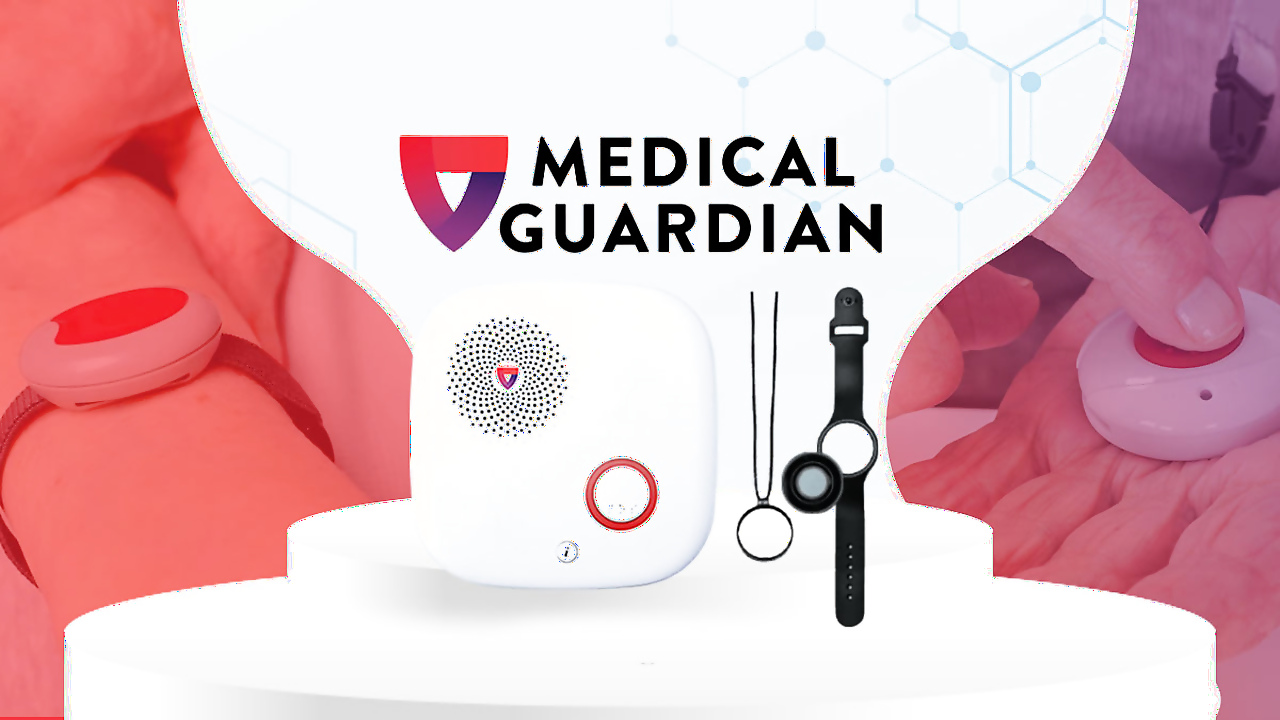
Pros:
- Personalized safety solutions
- Offers mobile and landline connectivity
- In-home and on-the-go coverage
- Upfront pricing
Cons:
- Complex website interface
Overview
Medical Guardian is a reliable provider of medical alert systems, tailored to meet the needs of seniors and individuals seeking a safety solution. Medical Guardian’s suite of devices and services offers dependability in protecting lives.
Why We Chose Medical Guardian
We picked Medical Guardian because it offers personalization for the best medical alert systems. It also provides consistent coverage and responsive support. Users can entrust their safety to a brand that prioritizes customized protection.
Cost
These are the prices of Medical Guardian’s monitoring and subscription plans:
- MGMove Smartwatch: $39.95/month
- Mini Guardian: $44.95/month
- Mobile 2.0: $44.95/month
You can pick the plan to matches your specific requirements and budget.
In-Home Range
Medical Guardian provides comprehensive protection within an in-home range. The medical alert devices are engineered to ensure that users maintain a strong and reliable connection throughout their homes, enabling them to move freely while staying connected to the medical alert systems.
Connectivity Options
Medical Guardian’s devices offer a choice between landline and cellular connections, recognizing the importance of both stability and modernity. This adaptability ensures that users can select the connectivity option that suits their preferences and circumstances.
Summary
As dependability is the cornerstone of safety, Medical Guardian takes center stage as a provider of personalized protection through the best medical alert systems. Medical Guardian offers users security and peace of mind with its steadfast in-home coverage, customizable plans, and versatile connectivity choices.
>>Check the best plans and prices for Medical Guardian here
4. Bay Alarm Medical – Best for Affordability

Pros:
- Budget-friendly pricing
- Supports cellular or landline connectivity
- Fall detection options available
- Indoor and on-the-go alternatives
Cons:
- Multiple options may be confusing
Overview
Bay Alarm Medical offers comprehensive care through medical alert systems that won’t break the bank. Its devices and services provide a holistic approach that addresses individual needs with precision and affordability.
Why We Chose Bay Alarm Medical
We included Bay Alarm Medical in our list because it is a viable option for budget-conscious users who need fall detection. Another reason we picked this provider is because it gives customers flexible options in terms of plans and connectivity.
Cost
Here are the prices of Bay Alarm Medical’s plans:
- SOS Home Landline: $24.95/month
- SOS Home Cellular: $29.95/month
- SOS Home Cellular w/ Fall Detection: $39.95/month
- SOS All-in-One: $39.95/month
- SOS All-in-One w/ Fall Detection: $49.95/month
In addition to the SOS Home and All-in-One packages, Bay Alarm Medical also features SOS Mobile and Smartwatch plans You may select the option that matches your preferences and financial considerations.
In-Home Range
Bay Alarm Medical provides extensive coverage indoors. Its medical alert devices enable seamless connectivity throughout users’ living spaces. This gives them the freedom to perform movements and daily activities while staying connected to the medical alert systems.
Connectivity Options
Bay Alarm Medical allows users to choose between landline and cellular connectivity options. This versatility acknowledges the diversity of users’ needs and preferences, ensuring that individuals can select the connectivity solution that suits them.
Summary
Bay Alarm Medical’s affordable prices make it a practical choice for customers searching for budget-friendly medical alert systems. With its fall detection option, steadfast in-home coverage, and adaptable connectivity choices, Bay Alarm Medical provides a safety solution that encompasses extensive protection and support.
>>Check the best plans and prices for Bay Alarm Medical here
5. Medical Alert – Best for Straightforward Features
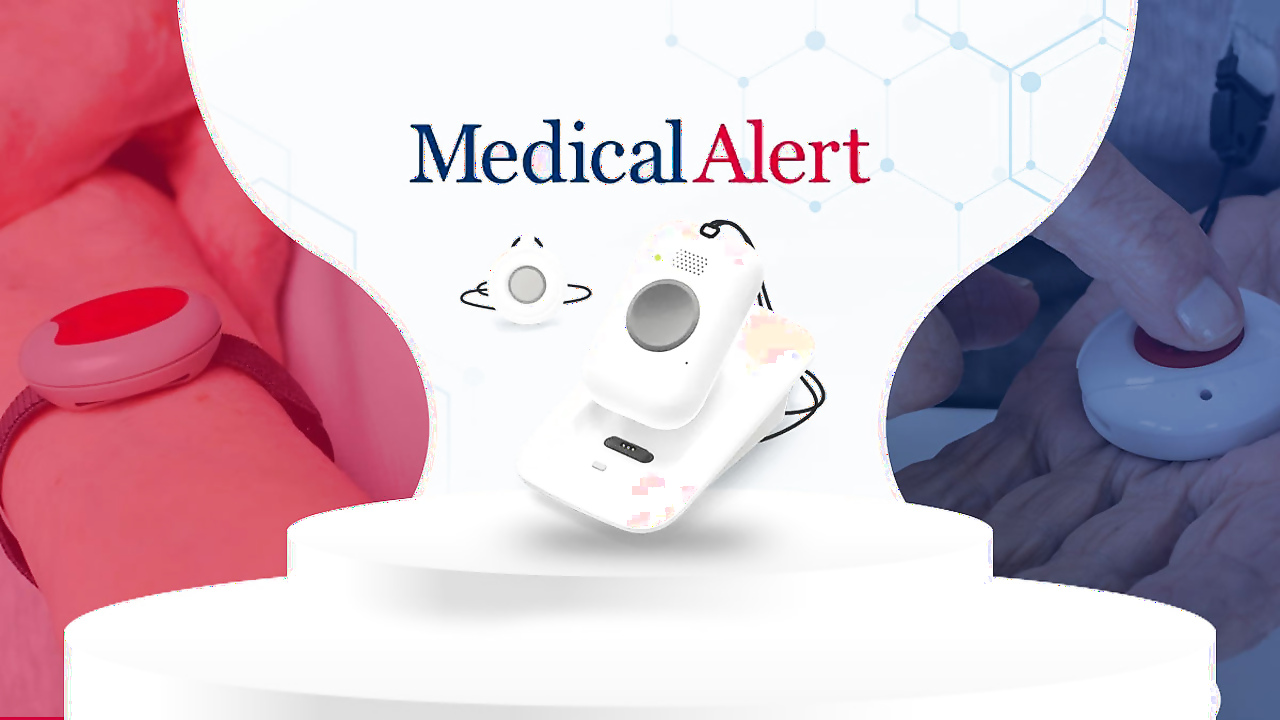
Pros:
- User-friendly devices
- Cost-effective costs
- Home and mobile options available
- Stable connectivity
Cons:
- Only starting prices are listed on the website
Overview
Medical Alert is an excellent solution for older adults, recognizing the unique needs and vulnerabilities that come with aging. Medical Alert caters to the safety concerns of seniors by offering specialized medical alert systems with simple features.
Why We Chose Medical Alert
We chose Medical Alert because the straightforward function of its devices makes it appropriate for senior users. Furthermore, its landline connectivity makes it a good choice for older users who prioritize dependability.
Cost
These are the costs of Medical Alert’s plans:
- Home System: Starts at $19.95/month
- Mobile System: Starts at $39.95/month
This approach to affordability, similar to Bay Alarm Medical, echoes the brand’s dedication to inclusivity, enabling seniors to choose a service that suits their preferences and budget.
In-Home Range
Seniors can experience the full extent of protection within their homes offered by Medical Alert’s devices. Engineered for safety and ease of use, the medical alert devices provide comprehensive coverage throughout users’ living spaces.
Connectivity Options
While there is a pricier mobile option, Medical Alert’s devices primarily rely on landline connections, a choice that resonates well with seniors who value stability, straightforwardness, and familiarity. By maintaining a steadfast and reliable connection, Medical Alert ensures that seniors can rely on the medical alert systems, offering reassurance in times of need.
Summary
Medical Alert is one of the best medical alert systems for seniors seeking a user-friendly solution that caters to their well-being. It is more than a safety net thanks to its senior-centric approach, straightforward features, in-home coverage, and cost-effective prices.
>>Check the best plans and prices for Medical Alert here
6. LifeStation – Best for Emergency Assistance
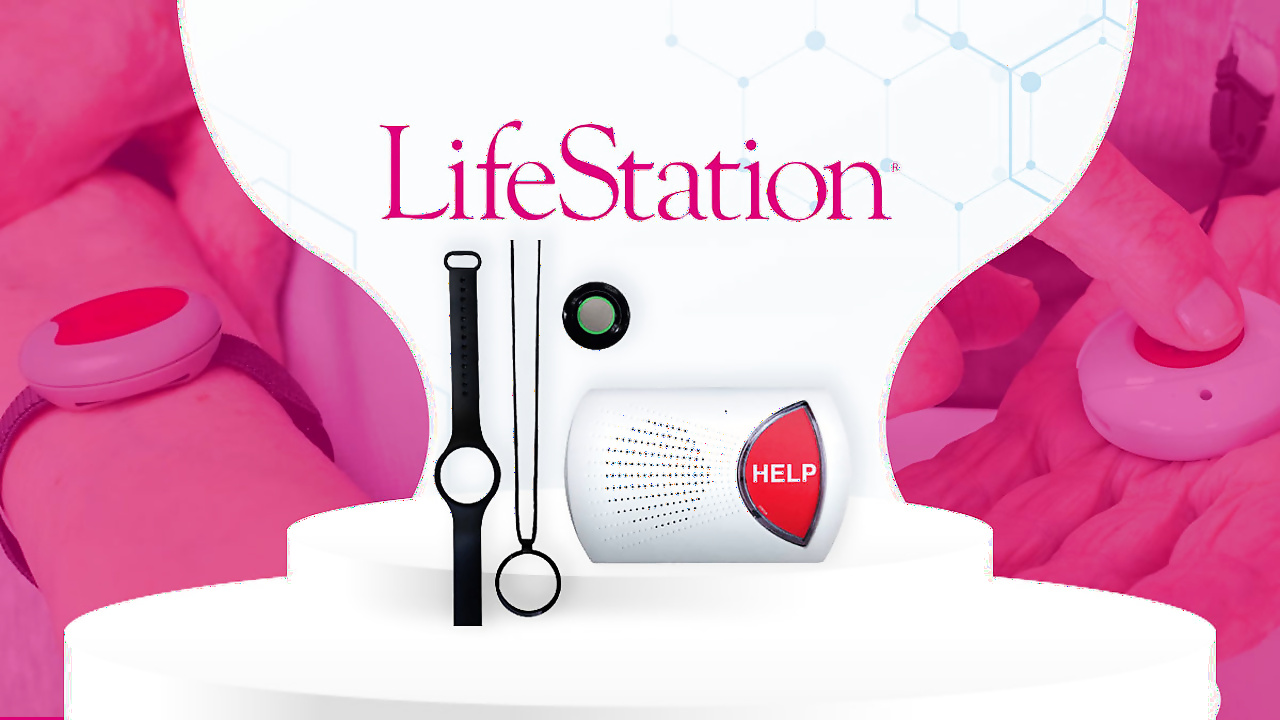
Pros:
- 24/7 emergency help
- Fast response time
- Indoor and outdoor coverage
- Reasonable price
Cons:
- The website only lists the starting price for the medical alert system
Overview
LifeStation is a provider of medical alert systems for seniors who need the assurance of round-the-clock support. The company claims to have one of the quickest response times in the industry. It aims to meet the needs of older users through its medical alert devices, whether they are mostly staying at home or often going out.
Why We Chose LifeStation
We included LifeStation in our roundup because it offers emergency help on a 24/7 basis. Its representatives are always on standby to answer calls and to immediately send assistance if necessary.
Cost
The price of LifeStation’s At Home Medical Alert System begins at $22.95 per month. Furthermore, LifeStation lets users upgrade and create a plan with their preferences and financial considerations in mind.
In-Home Range
Within the safety of their homes, users can experience the full extent of protection provided by LifeStation’s medical alert devices. It ensures uninterrupted connectivity regardless of the user’s location within their residences, the devices offer vigilance that extends to their living spaces.
Connectivity Options
LifeStation’s devices predominantly rely on landline connectivity, a choice that resonates with users who value the stability and reliability associated with traditional connections. This ensures that users can confidently rely on the medical alert system.
Summary
LifeStation offers a dependable safety solution that protects seniors on a daily basis. It provides users and their families with a safety net through its emergency assistance, steadfast in-home coverage, and customizable plans.
>>Check the best plans and prices for LifeStation here
7. Lively – Best for Caregiver Coordination

Pros:
- Convenient caregiver app
- Fall detection option available
- Home-based and on-the-go coverage
- Round-the-clock monitoring
Cons:
- More expensive than some competitors
Overview
Lively is a provider of medical alert systems that encourages the involvement of caregivers in keeping track of their patients’ well-being. It also offers 24/7 monitoring services through smart gadgets.
Why We Chose Lively
We selected Lively as part of our roundup because it provides a smart caregiver app, one of the useful types of apps you can download that lets you receive alerts about the user. Additionally, it gives customers the option to avail of fall detection features.
Cost
The price of Lively’s Senior Medical Alert Device with Fall Detection is $49.99. While it is costlier than other alternatives, this package helps you receive assistance right away in case of falls and similar accidents.
In-Home Range
Lively offers protection within the boundaries of users’ abodes. Users can navigate their living spaces with the confidence of remaining under the surveillance of Lively’s safety net.
Connectivity Options
Lively gives users a choice between landline and cellular connectivity, allowing users to adjust the gadgets to their needs and circumstances.
Summary
Lively offers the best medical alert systems that encourage coordination between caregivers and their patients. It provides a caregiver app, fall detection functions, and in-home coverage.
>>Check the best plans and prices for Lively here
8. Lifeline – Best for User-Friendly Technology
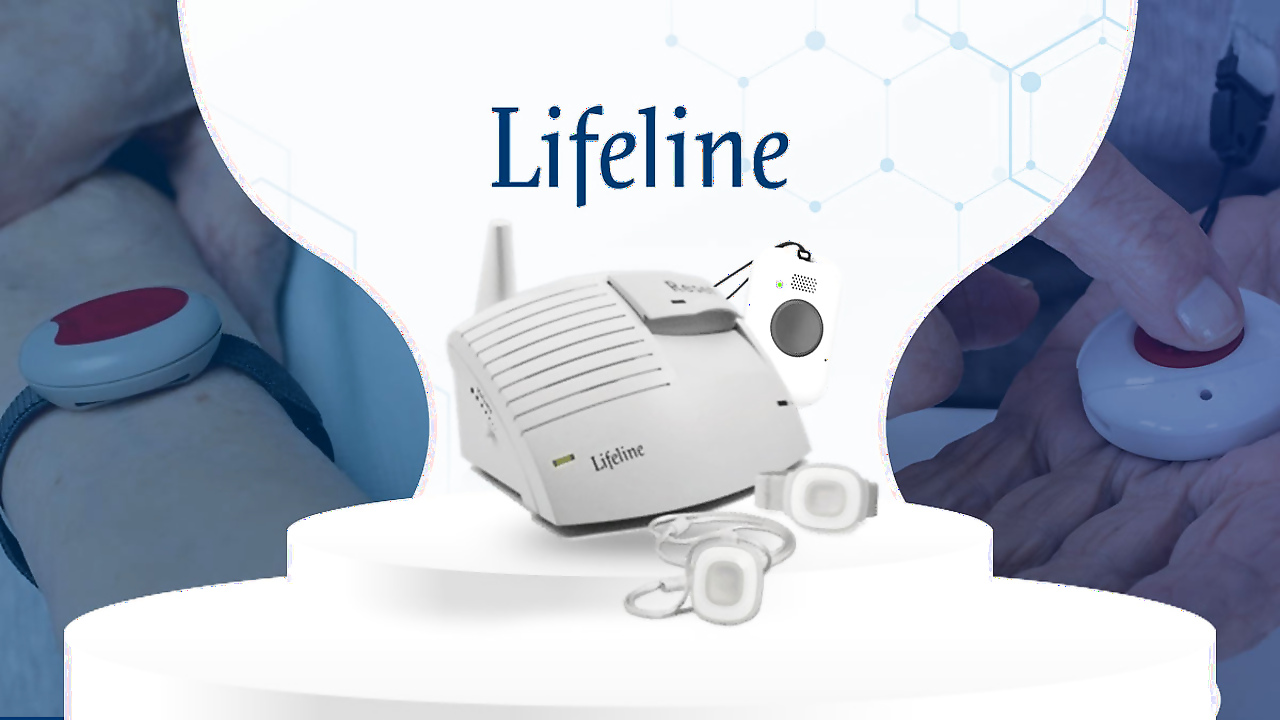
Pros:
- Wearable help button
- Landline or mobile connectivity
- At-home and on-the-go protection
- Transparent pricing
Cons:
- Minor risk of strangulation for Lifeline neck cords
Overview
Lifeline is another leader in the medical alert systems industry that promotes inclusive protection. Its devices incorporate user-friendly technology to ensure that the safety solutions are accessible to all. This provider is ideal for seniors and individuals with diverse health conditions.
Why We Chose Lifeline
We decided to feature Lifeline in this list because of its dedication to inclusivity and user-friendliness. The medical alert devices make it easy for seniors and people with health issues to request help with the simple push of a button, which they can wear as a pendant or wristband.
Cost
Here are the prices of Lifeline’s medical alert services:
- HomeSafe Landline: $29.95/month
- HomeSafe Cellular: $43.95/month
- On the Go: $49.95/month
Lifeline offers different plans designed to meet various needs, ensuring you can pick the one that matches your preferences and financial circumstances.
In-Home Range
Users can expect constant connectivity in their homes if they subscribe to Lifeline. This allows them to move freely without compromising safety with the help of the medical alert system.
Connectivity Options
Although there is a mobile option, Lifeline medical alert devices predominantly rely on landline connectivity, a choice focusing on stability and dependability.
Summary
Lifeline promotes inclusive protection through user-friendly technology in the best medical alert systems. It offers steadfast in-home coverage, dual connectivity options, and easy-to-use devices.
>>Check the best plans and prices for Lifeline here
9. Aloe Care Health – Best for Smart Home Integration

Overview
Aloe Care Health is a modern source of medical alert systems that combines cutting-edge technology and attentive care. It emphasizes proactive health monitoring and user well-being by supporting integration between its devices and a smart home system.
Why We Chose Aloe Care Health
We included Aloe Care Health in this selection because of its advanced monitoring features. It pairs smart technology with medical alert systems, offering users a unique fusion of wellness protection.
Cost
These are the prices of Aloe Care Health’s plans:
- Essentials: $29.99/month
- Mobile Companion Go: $29.99/month
- Essentials Plus: $39.99/month
- Total Care: $49.99/month
You can select a service that clicks with your preferences and budget.
In-Home Range
Aloe Care Health’s medical alert devices offer state-of-the-art monitoring features. These gadgets are strategically positioned to provide comprehensive coverage throughout users’ homes.
Connectivity Options
Aloe Care Health’s devices leverage landline and cellular connections. It caters to users who value the stability of traditional connections and those who seek the convenience of modern technology.
Summary
Aloe Care Health’s focus on advanced monitoring sets it apart as an innovative provider of the best medical alert systems. It offers users a high-quality safety solution through its smart integration of medical and home technology, comprehensive in-home coverage, and dedication to user wellness.
>>Check the best plans and prices for Aloe Care Health here
What Is a Medical Alert System?
Medical alert systems are crucial in enhancing safety and providing peace of mind, particularly for vulnerable individuals such as seniors or those with health conditions.
These systems are designed to swiftly connect users with emergency assistance in case of unexpected events. By employing wearable devices and base units, medical alert devices ensure that help is just a button press away, regardless of the situation.
How Do Medical Alert Systems Work?
Medical alert devices function through a straightforward and effective process. When an emergency arises, users press a button on their wearable device or base unit, instantly establishing a connection with a dedicated monitoring center staffed by trained professionals.
These experts assess the situation, communicate with the user, and take appropriate measures, whether that involves contacting family members and neighbors or dispatching emergency services.
Who Is a Medical Alert System For?
Medical alert systems cater to various individuals who value extra protection and rapid response during emergencies. Seniors, especially those living independently, find comfort in knowing they can quickly summon help in case of falls or health-related issues.
Additionally, individuals with chronic conditions or those recovering from surgery can benefit from peace of mind with assistance at their fingertips.
Different Types of Medical Alert Systems
Medical alert devices come in various forms to accommodate unique needs and circumstances. In this section, we check out the prominent types of medical alert systems, shedding light on their specific features and how they cater to particular users.
In-Home Medical Alert Systems
In-home medical alert systems are tailored for individuals who primarily spend their time indoors. Comprising a base unit and wearable devices, these systems ensure seamless coverage within the home environment. Users can confidently move from room to room, knowing that help is accessible at any corner of their living space.
Mobile Medical Alert Systems
Mobile medical alert systems are designed for those who lead active lives beyond the boundaries of their homes. Equipped with a wearable device containing GPS technology, these systems allow users to call for help from anywhere.
This mobility is especially advantageous for seniors or individuals who enjoy outdoor activities, ensuring that assistance is within reach even when away from home.
>>Check the best plans and prices for MobileHelp here
Key Features of Medical Alert Systems
At the heart of any medical alert system lies a range of features contributing to its effectiveness and functionality. In this section, we explore the key features that distinguish medical alert systems and contribute to their ability to provide timely assistance and peace of mind. By understanding these features, you can assess which ones align with your needs.
Live 24/7 Monitoring
At the heart of every medical alert system is live 24/7 monitoring. This service guarantees that a team of trained professionals is always available to respond to emergencies promptly. Their ability to assess situations and coordinate with appropriate responders ensures timely assistance.
Fall Detection
Medical alert systems with fall detection have advanced sensors to identify falls and automatically trigger an alert to the monitoring center, even if the user is unable to press the button manually. This feature is particularly important for individuals prone to falls.
Wall Buttons
Strategically placed wall buttons provide an additional layer of accessibility within the home. Users can install these buttons in areas where their wearable device might not be immediately accessible during an emergency, such as the bathroom or bedroom.
Lockboxes
Lockboxes are critical in granting emergency responders access to a user’s home. These secure containers hold spare keys, allowing authorized personnel to enter the premises without causing damage in cases of urgent need.
Water-Resistant Wearables
Water-resistant wearables empower users to wear their devices even in the shower. This feature ensures continuous complete protection, regardless of daily routines.
GPS Tracking
Integrated GPS tracking is a hallmark of mobile medical alert devices. By leveraging GPS technology, these systems can pinpoint a user’s exact location when assistance is needed, enabling rapid response and intervention.
Activity Monitoring
Specific medical alert devices offer activity monitoring features. By tracking daily routines and patterns, caregivers and loved ones can be alerted to behavior or activity changes that might indicate potential health issues.
Medication Reminders
Some systems incorporate medication reminders, assisting users in following their medication schedules. This feature is vital for individuals managing complex medication regimens.
>>Check the best plans and prices for MobileHelp here
How Much Does a Medical Alert System Cost?
Cost is one of the critical considerations for many users, and the pricing structures of medical alert systems can vary significantly. Different factors may affect your initial investment and ongoing expenses, and in this section, we delve into the financial aspects of medical alert devices.
Yearly and Monthly Base Costs
The cost of a medical alert system varies depending on the provider and the chosen plan. The pricing structure typically includes a base fee covering the monitoring service, which can be paid monthly or annually.
Upfront Fees
Certain providers may impose upfront fees for equipment, installation, or activation. These costs should be considered when evaluating the overall affordability of a medical alert system.
Costs of Optional Features
Additional features like fall detection or GPS tracking may come with extra charges. It’s essential to fully understand the pricing structure to make an informed decision.
Warranties and Policies
Examining the provider’s warranty policies and cancellation terms is paramount. This ensures that users know their rights and responsibilities in case of equipment malfunction or contract termination.
>>Check the best plans and prices for MobileHelp here
How To Choose the Best Medical Alert System for You
Selecting the most suitable medical alert system demands thoughtful consideration of your individual needs and preferences, which should be a thorough process as you:
- Assess your lifestyle and needs: Evaluate your daily routine and mobility. Do you spend most of your time at home or on the go? Consider any medical conditions or concerns requiring specific features, such as fall detection or medication reminders.
- Prioritize key features: Different medical alert systems offer a range of features, from basic emergency assistance to advanced monitoring capabilities. Prioritize the features that align with your requirements.
- Research providers’ reputations: Look into the reputations of medical alert system providers. Read reviews, testimonials, and online feedback to gauge the quality of their services, responsiveness, and customer support.
- Consider pricing and plans: Compare different providers’ pricing structures. Be sure to understand the monthly or yearly base costs, any upfront fees, and potential charges for optional features. Consider your budget and assess which plans offer the best value for money.
- Evaluate contract terms and policies: Carefully read potential providers’ contract terms and cancellation policies. Ensure that you’re comfortable with the terms and that they align with your preferences.
- Test customer support: Reach out to the customer support of potential providers with any questions or concerns you may have. This interaction can provide insights into their responsiveness, willingness to assist, and overall approach.
Methodology: How We Picked the Best Medical Alert Systems of 2023
At the core of our selection process for the best medical alert systems of 2023 lies a comprehensive methodology designed to provide a well-rounded evaluation. Our approach considers various factors contributing to each medical alert system’s effectiveness, reliability, and user satisfaction.
Range of Use
We evaluated medical alert systems based on their adaptability to different user profiles and living situations. Systems that cater to a wide range of individuals, from seniors to those with specific health needs, received higher scores.
Automatic Fall Detection
The inclusion of automatic fall detection technology, which can swiftly alert the monitoring center in case of falls, played a significant role in our assessment. Systems offering this feature received favorable consideration.
Real-Time Emergency Connectivity
The ability of a medical alert system to provide real-time emergency connectivity, ensuring an immediate response from the monitoring center, was a critical factor. Systems with dependable and rapid connectivity ranked higher.
Extra Features
We considered the presence of additional features such as GPS tracking, activity monitoring, and medication reminders. These extras contribute to the versatility and effectiveness of the system.
Cost
Affordability is essential, and we assessed the value each system provides in relation to its pricing structure. Systems offering competitive pricing while delivering robust features earned better ratings.
>>Check the best plans and prices for MobileHelp here
Frequently Asked Questions (FAQs): Best Medical Alert Systems
Learn the answers to common questions about medical alert devices.
What Are the Best Medical Alert Systems?
Determining the best medical alert systems depends on many factors, such as individual needs, preferences, and living situations. While our list includes nine distinguished providers, it’s important to recognize that the “best” choice varies for each person. Consider aspects like mobility, in-home coverage, and additional features to find your best option.
How Much Do Medical Alert Systems Cost?
The cost of a medical alert system is influenced by multiple factors, including the provider, the chosen plan, and optional features. Generally, monthly fees can range from around $25 to $50 and above, depending on the selected plan’s level of coverage and additional functionalities. Understanding the total investment is crucial as you navigate pricing options.
How Do Medical Alert Systems Work?
Medical alert devices function through a straightforward and effective process. When an emergency arises, users press a button on their wearable device or base unit, instantly establishing a connection with a dedicated monitoring center staffed by trained professionals.
These experts assess the situation, speak with the user, and initiate appropriate actions, such as notifying family members and neighbors or dispatching emergency services. The rapidity and reliability of this process underline the crucial role medical alert systems play in ensuring swift assistance during critical moments.
Are Medical Alert Systems Worth It?
Medical alert devices offer exceptional value by addressing a fundamental need: ensuring safety, especially in emergencies. Medical alert systems for seniors provide a lifeline that can significantly enhance their quality of life, but they are equally important for those with medical conditions and living alone.
>>Check the best plans and prices for MobileHelp here
Are Medical Alert Systems Covered by Insurance?
Insurance coverage of medical alert systems varies depending on the provider and the specific insurance policy. While some long-term care insurance policies may include coverage for medical alert devices, it’s crucial to consult your insurance provider to understand the extent of coverage and any associated terms or requirements.
Does Medicare Cover Medical Alert Systems?
Generally, traditional Medicare does not cover the costs of medical alert systems. However, certain Medicare Advantage plans may offer coverage or reimbursement options. It’s important to directly contact your insurance provider to inquire about coverage specifics and determine if any alternatives exist within your plan.
Does the AARP Recommend a Medical Alert System?
Yes, the AARP (American Association of Retired Persons) does provide recommendations for medical alert systems. These recommendations are valuable resources, and by combining the AARP’s recommendations with your own research, you can confidently choose a medical alert system that offers the level of safety and support you seek.
Is Life Alert Worth the Money?
The value of Life Alert, like any medical alert system, depends on individual circumstances and preferences. Life Alert is a prominent and recognized provider, but its cost may be relatively higher than other market options.
What’s Better Than Life Alert?
Several medical alert systems offer comparable or even superior features to Life Alert. While Life Alert is well-known, exploring alternatives to determine what might be better suited to your needs is essential. Providers like MobileHelp, ADT, and Medical Guardian offer a solid range of features and pricing options.
>>Check the best plans and prices for MobileHelp here
Do Unmonitored Medical Alert Systems Work?
Unmonitored medical alert systems function without connecting to a professional monitoring center. Instead, they often trigger automated alerts to pre-set contacts or emergency services. While these systems can provide a level of assistance, they lack the immediate access to professional help that monitored systems offer.
Final Thoughts on the Best Medical Alert Systems
Choosing your best medical alert systems will require both understanding their features and assessing your safety needs. We’ve provided you with a comprehensive guide on the most popular systems like MobileHelp, but you must ensure your preferred option meets your requirements.
Prioritize a system that enhances your safety, provides peace of mind, and aligns with your lifestyle. The best medical alert systems can empower you or your loved ones to embrace independence while relying on a dependable safety net in times of need.
>Check the best plans and prices for MobileHelp here
This is a Partnered Post.




















Comments
0 comment